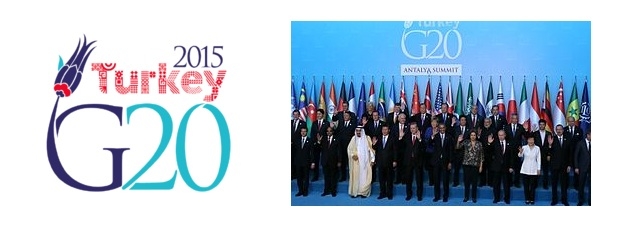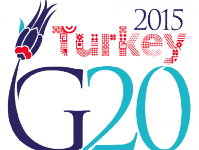Business
VLADIMIR PUTIN COMPLETE ANSWERS TO JOURNALISTS FOLLOWING the G20 SUMMIT
ANTALYA - NOVEMBER 16, 2015

G20 ANTALYA SUMMIT
USPA NEWS -
President of Russia Vladimir Putin: Good evening, friends, ladies and gentlemen,
Before we start these questions and answers, I want to thank the President of Turkey, Mr Erdogan, and all of our Turkish colleagues for the very professional organisation of the G20 summit....
Before we start these questions and answers, I want to thank the President of Turkey, Mr Erdogan, and all of our Turkish colleagues for the very professional organisation of the G20 summit....
President of Russia Vladimir Putin: Good evening, friends, ladies and gentlemen,
Before we start these questions and answers, I want to thank the President of Turkey, Mr Erdogan, and all of our Turkish colleagues for the very professional organisation of the G20 summit. They created a very good, trusting and open atmosphere in which to work and discuss the issues that were the whole point of our getting together.
I want to thank Turkey´s people for their welcoming attitude to our work and the help that we received at practically every step.
Question: It would seem that fighting terrorism was one of the summit´s main subjects of discussion. We know that there will be no resolving this problem unless we take more effective steps to prevent the financing of terrorism. Were any concrete measures discussed at the summit? What was the line of discussion on these measures, and did you reach any agreements ?
Vladimir Putin: Yes, of course, this issue was one of the key issues, the fight against terrorism, especially after the tragic events with the hostage taking and loss of life in Paris. Yes, of course we are well aware that we must cut off the channels used to finance terrorism, and we discussed this.
I gave examples based on our information about individuals financing various Islamic State subgroups in different countries. We have established that financing is coming from 40 countries, including G20 countries. We discussed this issue.
I gave examples based on our information about individuals financing various Islamic State subgroups in different countries. We have established that financing is coming from 40 countries, including G20 countries. We discussed this issue.
We discussed the need to implement the relevant UN Security Council resolution, which was adopted on Russia´s initiative, on preventing financing of terrorism, unlawful trade in objects of art after terrorists pillage museums in the territories they seize, and unlawful sale of oil and petroleum products and earnings from this sale.
I also showed our colleagues satellite images and aerial photographs that show very clearly the scale of this illegal trade in oil and petroleum products. You see columns of refuelling vehicles stretching for dozens of kilometres in lines so long that from a height of 4,000““5,000 metres they vanish over the horizon. It really looks more like an oil pipeline system.
I also showed our colleagues satellite images and aerial photographs that show very clearly the scale of this illegal trade in oil and petroleum products. You see columns of refuelling vehicles stretching for dozens of kilometres in lines so long that from a height of 4,000““5,000 metres they vanish over the horizon. It really looks more like an oil pipeline system.
We discussed this issue together, of course, and I hope that we will continue this work, which I think is extremely important for the fight against terrorism.
Question: Mr President, economic issues were always the G20´s primary focus. Among the economic issues you discussed with the other leaders, which do you see as particularly important? Another question: You discussed economic matters on the summit´s sidelines too and met with the head of the IMF. What did you discuss, what was the outcome of the talks, and what was the nature of the proposals you made regarding Ukraine´s debt to the IMF ?
Question: Mr President, economic issues were always the G20´s primary focus. Among the economic issues you discussed with the other leaders, which do you see as particularly important? Another question: You discussed economic matters on the summit´s sidelines too and met with the head of the IMF. What did you discuss, what was the outcome of the talks, and what was the nature of the proposals you made regarding Ukraine´s debt to the IMF ?
Vladimir Putin: Yes, the G20 is primarily an economic summit, a summit for discussing economic matters, and so as well as the fight against terrorism after the recent events and the terrorists´ increased activity, we discussed economic issues too, of course. I would highlight investment issues, particularly investment in big infrastructure projects and support for small and medium businesses.
I would also note the issue of fighting tax evasion and illegal reduction of tax base.
I would also note the issue of fighting tax evasion and illegal reduction of tax base.
A third issue I would highlight is that of older people´s involvement in labour activity and labour market issues in general. There are two aspects here: reducing youth unemployment (the G20 has set the objective of bringing the level down to 15 percent over the next few years), and, as I said, employment for senior citizens, the so-called “˜silver´ economy.
All developed countries have an aging population now. The amount of labour resources is decreasing, the number of people making payments into pension funds is falling, but the number of people who have reached retirement age is increasing. This is a big challenge for the developed countries´ economies, and we discussed this issue, of course.
All developed countries have an aging population now. The amount of labour resources is decreasing, the number of people making payments into pension funds is falling, but the number of people who have reached retirement age is increasing. This is a big challenge for the developed countries´ economies, and we discussed this issue, of course.
I would also note the climate change issue, which is closely related to economic development issues and ensuring economic growth.
On the IMF, this is one of the biggest problems in our relations with Ukraine right now, and it is a matter we have been discussing actively over these last months with our colleagues from the International Monetary Fund.
On the IMF, this is one of the biggest problems in our relations with Ukraine right now, and it is a matter we have been discussing actively over these last months with our colleagues from the International Monetary Fund.
Our partners from the IMF have been convincing us that we could accept to restructure Ukraine´s debt of $3 billion, which was to have been paid by the end of next month, the end of this year. They say that we could make a concession to Ukraine and defer this payment of $3 billion to next year. They say that this would help Ukraine and would ensure that Russia, as the creditor, receives its payment.
We drew our partners´ attention to the fact that our debt is not a private debt, but is sovereign debt that was offered to Ukraine on non-market principles and conditions. But in order to ensure the return of this money, and to avoid putting Ukraine in a difficult situation, we made what I think was an unexpected proposal to our partners. Not only did we agree to a restructuring of Ukraine´s debt, but we proposed better conditions for this restructuring than those the International Monetary Fund requested of us.
We were asked to defer this payment of $3 billion to next year. I said that we are ready to accept a deeper restructuring with no payment this year, a payment of $1 billion next year, $1 billion in 2017, and $1 billion in 2018. But our partners are sure that Ukraine´s solvency will grow and that we can be sure of receiving $3 billion next year. If this is the case, they see no risk in providing guarantees for this credit.
We have asked for such guarantees either from the United States government, the European Union, or one of the big international financial institutions. We hope that this matter will be settled by the start of December this year, given the International Monetary Fund´s work timetable.
I discussed this matter with Ms Lagarde, and also had the chance to have brief exchanges with the President of the United States and the US Secretary of the Treasury. They reacted to our proposal with interest. We agreed with our partners to discuss the details of our proposal very soon.
I discussed this matter with Ms Lagarde, and also had the chance to have brief exchanges with the President of the United States and the US Secretary of the Treasury. They reacted to our proposal with interest. We agreed with our partners to discuss the details of our proposal very soon.
If our partners are that certain that Ukraine´s solvency will improve, persuade us that this is so, and believe this themselves, let them provide guarantees. If they cannot provide guarantees, this means that they do not believe in the Ukrainian economy´s future. I think this would not be good for them if this is so, and if they are trying to convince us of something that is not in fact the case, this would not be good for our Ukrainian partners either.
We think that this proposal is a realistic possibility and we see no problems in sharing the risks with our partners...
..... TO BE CONTINUED WITH PART TWO ON : TURKEY - RUSSIA - PARIS
Ruby BIRD
http://www.portfolio.uspa24.com/
We think that this proposal is a realistic possibility and we see no problems in sharing the risks with our partners...
..... TO BE CONTINUED WITH PART TWO ON : TURKEY - RUSSIA - PARIS
Ruby BIRD
http://www.portfolio.uspa24.com/
Russian Plane Ruby Bird Complete Answers Vladimir Putin Moswow Syria Ukraine Daesh Isis Turkey Washington Usa Imf Coalition Terrorism Paris Attacks Opposition Allies Ennemies Egypt Carsh
Liability for this article lies with the author, who also holds the copyright. Editorial content from USPA may be quoted on other websites as long as the quote comprises no more than 5% of the entire text, is marked as such and the source is named (via hyperlink).






